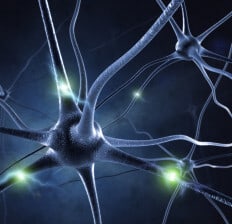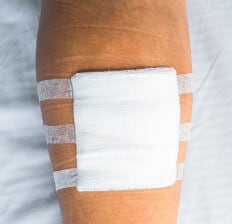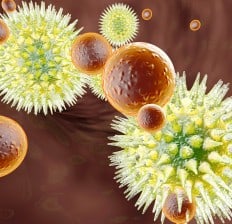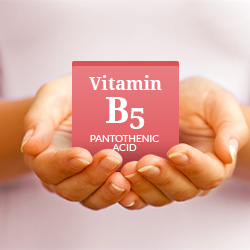Vitamin B5 Benefits, Deficiency, Food Sources - Vitamin B5, also known as pantothenic acid, is a water-soluble vitamin that is found in all living cells within the body. Studies have shown that there are plenty of important B5 vitamin roles within the body, such as converting nutrients from food into energy, balancing blood sugar, reducing bad cholesterol, lowering high blood pressure, preventing nerve damage and pain, and preventing heart failure.
Like the other B-vitamins, vitamin b5 plays a role in energy metabolism, acting as a coenzyme to energy-producing chemical reactions. It plays a role in the synthesis of fat, hormones, and carbohydrates that we take in from the foods we eat, turning them into usable energy that the body uses in many ways.
The energy that vitamin B5 helps to produce, is what fires the neurotransmitters in your brain. These neurotransmitters carry chemical signals throughout our entire body to keep every system functioning properly. Because of this role, B5 vitamins are crucial for maintaining the health of the nervous system.
Aside from being critical in manufacturing red blood cells, vitamin B5 also plays a part in producing sex and stress-related hormones produced in the adrenal glands. The adrenal glands are small glands which sit atop the kidneys and control numerous important functions in the body.
Vitamin B5 is also important in maintaining a healthy digestive tract, boosting immunity in the process. It importantly works with other B vitamins in the B Vitamin Complex, helping the body use other vitamins like riboflavin (vitamin B2).
B5 vitamin sources include both plants and animals foods such as meat, organ meat, beans and legumes, certain nuts and seeds, raw milk, and eggs. There are plenty of ways to get proper amounts of vitamin B5 into your diet, and because many people consume B5 vitamin food sources frequently, luckily today we don’t see a large percentage of adults suffering from dangerous B5 vitamin deficiencies.
Vitamin B5 Deficiency Symptoms
Since vitamin B5 occurs in almost all foods, a deficiency is extremely rare in western developed nations where people are uncommonly malnourished and not acquiring enough calories daily. However a vitamin B5 deficiency may occur in combination with deficiencies of other B vitamins.
Symptoms of a vitamin B5 deficiency may include:
People at a greater risk of developing a vitamin B5 deficiency include alcoholics, women on oral contraceptives/ birth control pills, people with severe malnutrition, and people with impaired absorption of vitamins and minerals due to certain medications or intestinal disorders.
12 Vitamin B5/ Pantothenic Acid Food Sources
Here are 13 foods which are naturally high in vitamin B5, in addition to many other important nutrients too, especially other B vitamins. The percentages below are based on the daily recommended value of 5% per adult male or female:
Like the other B-vitamins, vitamin b5 plays a role in energy metabolism, acting as a coenzyme to energy-producing chemical reactions. It plays a role in the synthesis of fat, hormones, and carbohydrates that we take in from the foods we eat, turning them into usable energy that the body uses in many ways.
The energy that vitamin B5 helps to produce, is what fires the neurotransmitters in your brain. These neurotransmitters carry chemical signals throughout our entire body to keep every system functioning properly. Because of this role, B5 vitamins are crucial for maintaining the health of the nervous system.
Aside from being critical in manufacturing red blood cells, vitamin B5 also plays a part in producing sex and stress-related hormones produced in the adrenal glands. The adrenal glands are small glands which sit atop the kidneys and control numerous important functions in the body.
Vitamin B5 is also important in maintaining a healthy digestive tract, boosting immunity in the process. It importantly works with other B vitamins in the B Vitamin Complex, helping the body use other vitamins like riboflavin (vitamin B2).
B5 vitamin sources include both plants and animals foods such as meat, organ meat, beans and legumes, certain nuts and seeds, raw milk, and eggs. There are plenty of ways to get proper amounts of vitamin B5 into your diet, and because many people consume B5 vitamin food sources frequently, luckily today we don’t see a large percentage of adults suffering from dangerous B5 vitamin deficiencies.
Vitamin B5 Deficiency Symptoms
Since vitamin B5 occurs in almost all foods, a deficiency is extremely rare in western developed nations where people are uncommonly malnourished and not acquiring enough calories daily. However a vitamin B5 deficiency may occur in combination with deficiencies of other B vitamins.
Symptoms of a vitamin B5 deficiency may include:
- fatigue
- depression
- irritability
- insomnia
- stomach pains
- vomiting
- burning feet
- upper respiratory infections
- muscle cramps
People at a greater risk of developing a vitamin B5 deficiency include alcoholics, women on oral contraceptives/ birth control pills, people with severe malnutrition, and people with impaired absorption of vitamins and minerals due to certain medications or intestinal disorders.
12 Vitamin B5/ Pantothenic Acid Food Sources
Here are 13 foods which are naturally high in vitamin B5, in addition to many other important nutrients too, especially other B vitamins. The percentages below are based on the daily recommended value of 5% per adult male or female:
1. Beef Liver
2. Avocado
3. Sunflower Seeds
4. Duck
5. Portabella Mushrooms
6. Eggs
7. Salmon
8. Lentils
9. Sun-dried tomatoes
10. Yogurt (whole milk)
11. Broccoli
12. Veal (responsibly raised)
Vitamin B5 / Pantothenic Acid Health Benefits
1. Improves Cardiovascular Health
Your body needs vitamin B5 or pantothenic acid to synthesize cholesterol. A derivative of pantothenic acid is called pantethine, which has been studied for its ability to positively influence heart health and especially cholesterol.
Vitamin B5 plays a part in the use and regulation of cholesterol, helping to maintain healthy levels of cholesterol within the arteries and to prevent dangerous plaque build-up which can possibly lead to a heart attack or stroke.
One other important vitamin B5 benefit is that it helps the body create red blood cells, which carry oxygen throughout our body. Vitamin B5 has been shown to enhance the level of hemoglobin in our bodies.
Vitamin B5 plays an important role in allowing Vitamin B2 to do its job, and vitamin B2 is involved in the prevention and treatment of anemia.
Vitamin B2 is required for steroid hormone synthesis and red blood cell production and helps with the transportation of oxygen to the cells to mobilize iron. Low-levels of vitamin B2 have been correlated with fatigue, shortness of breath, inability to exercise, and many other body functions.
2. Synthesizes Cholesterol
High serum concentration of LDL cholesterol is a major risk factor for coronary heart disease and numerous studies have shown that vitamin B5 may help to reduce “bad” LDL cholesterol and triglyceride levels in the blood of people with elevated blood fats. At the same time, it helps to raise “good” HDL cholesterol.
A daily dose of 900 mg of a vitamin B5 has been shown to lower LDL (bad) cholesterol and triglycerides, reducing the risk of cardiovascular disease. Keep in mind that 900 mg is significantly higher than the recommended daily amount of vitamin B5 per day, so this is only done with the supervision of your physician.
In some small studies, vitamin B5 seems to lower levels of cholesterol and triglycerides in people with diabetes, although more evidence is needed to prove this.
3. Metabolizes Food into Energy
All B vitamins help your body to convert carbohydrates into glucose, which is used as fuel and produces energy. It does this by synthesizing an enzyme known as coenzyme-A (CoA), which breaks down sugars in the form of glucose for energy. B vitamins also help the body to synthesize and metabolize fats and proteins.
Vitamin B5, along with other B vitamins, can help our bodies to use the foods we eat in order to rebuild our tissues, muscles, and organs. Because of the role it plays in digestion and nutrient extraction, digestive problems can be a sign of a serious vitamin B5 deficiency. And regularly eating foods high in Vitamin B’s, including B5, can help keep your metabolism functioning at optimal levels.
4. Maintains Healthy Nerve Function

Vitamin B5 is responsible for helping with nerve function, specifically for creating an important molecule called acetylcholine. The nervous system is dependent upon acetylcholine; this is the primary chemical that allows your nervous system to communicate back and forth with your organs.
Acetylcholine makes it possible for your brain and spinal chord to send nerve signals to our immune system, heart, lungs, kidneys, spleen, liver and more. It is also used to send nerve signals to muscles, so without enough vitamin B5, nerve damage and impairment in movement can develop.
This is why one of the primary signs of a serious B vitamin deficiency is muscle impairment and pain, including a condition known as burning feet syndrome. This occurs when a person experiences lack of feeling in their feet along with painful burning, inflammation, and the feeling of ongoing fatigue and weakness.
5. Improves Mental Performance

B vitamins in general are often correlated with improving mental function because they can decrease the risk for many problems such as brain function illnesses or age-related memory and function loss.
Obtaining proper amounts of B vitamins including vitamin B5 may be able to help prevent memory loss, migraine headaches, chronic brain syndrome, depression, motion sickness, insomnia, and even alcohol dependence.
Vitamin B5 is known to regulate our hormones, therefore it has the ability to reduce stress, anxiety, and depression. Vitamin B may also cut down on body fatigue because it balances hormones related to feelings of alertness or fatigue, and boosts our metabolism.
Physicians sometimes see vitamin B5 deficiencies in people who are chronically stressed. When we are deficient in vitamin B5, we lose our ability to react to stress effectively and show signs of adrenal fatigue. This can include having trouble sleeping, exercising, coping with problems, mood swings, weight gain or loss, and other stress symptoms.
One of the most important things to do to boost your metabolism is to reduce stress levels. Emotional stress and lack of sleep are really hard on your body and run down your hormones and metabolism, so the stress reducing effects of vitamin B5 is clearly a great tool in regards to your state of mind and metabolism.
6. Helps Control the Body’s Stress Response
B5 vitamin benefits include the ability to cope with stress. In fact without vitamin B5 and other B vitamins regulating hormones, the body could not survive, due to how the B vitamins help with adrenal function.
This is why people who are chronically stressed, or who are dealing with adrenal fatigue symptoms, are highly encouraged to take B vitamin supplements. B vitamins including pantothenic acid are useful in calming the nervous system, battling chronic stress, and regulating hormones which control appetite, energy, mood, temperature, and more.
Vitamin B5 is partially responsible for regulating adrenal function and creating the stress hormone cortisol. Studies have shown that pantothenic acid supplementation stimulates the ability of adrenal cells.
Cortisol is produced by the adrenal glands and is heavily involved in the body’s stress response, helping us to be alert and to fight off danger and perceived “predators” which are any external sources that cause the body to go into a stress state.
Although it gets a bad reputation for leading to weight gain, anxiety, and other fatigue, cortisol does have important jobs in the body; we need to maintain proper cortisol levels in order to have enough energy and concentration each day. Cortisol also helps our body fight inflammation on a day-t0-day basis.

7. Helps Wound Healing
Studies have shown that vitamin B5 can help in treating skin reactions from radiation therapy and may speed up wound and cut healing. It is also known to delay the appearance of premature aging, like wrinkles and dark spots on the skin.
Data gathered from recent studies suggest that pantothenic acid induces an accelerating effect of the normal healing process due to certain mechanisms that is helps control regarding the improvement in cellular multiplication.
The exact mechanism of the beneficial effect of vitamin B5 on skin remains unclear, but it is correlated significantly with increasing skin strength especially after surgery.
8. Helps with Symptoms of Rheumatoid Arthritis
Some early studies suggest that vitamin B5 may help with the painful symptoms of rheumatoid arthritis. One study found that people with Rheumatoid Arthritis may have lower levels of B5 in their blood than healthy people.

Lower levels of vitamin B5 were associated with the most severe symptoms of arthritis, including painful movements, stiffness, and inflammation.
It has been recorded that high doses of vitamin B5 can help with stiffness and pain in people suffering from Rheumatoid Arthritis. And taking B vitamin complex supplements has been correlated with lower levels of joint pain, enhanced muscle strength, and fewer symptoms associated with muscle or joint fatigue.
9. Aids in Immune Function
Vitamin B5 helps to create antibodies that our immune system produces in order to defend us against potential threats.
These can include environmental and allergic responses, as well as fighting off parasites, bacteria, viruses, the common cold or flu, and toxins.
Studies have shown that vitamin B5 can result in a reduction in the proliferation of different harmful parasites and has been shown to inhibit the growth of dangerous bacteria. For example it can help reduce infection of malaria, a deadly parasite.
We have to be able to produce enough immune antibodies in order to stay healthy and prevent disease. When we are chronically stressed, we lose some of our ability to fight off invaders and toxins because our body becomes depleted of energy while trying to focus on taking care of things that it sees as an immediate threat.
Because B vitamins help control the body’s stress response, they keep our immunity higher so we face less chance of becoming sick and run down.
In order to properly maintain immune function, we must have good digestive health and hormone function. Vitamin B5 helps with both of these things! Without high enough levels of B vitamins, we could not digest the molecules found in carbohydrate, fat, and protein foods and would not be able to access the “fuel” that keeps the body functioning and properly defending itself.
10. Helps Fight Acne & Protect Skin Health
Another benefit of vitamin B5 is to help maintain the health of skin and also hair. Vitamin B5 can reduce the appearance of premature aging including signs on the skin like wrinkles, dark spots, and discolorations. Studies have also shown that Vitamin B5 plays an important role in the pigmentation and growth of hair follicles.Vitamin B5 can help prevent hair from losing its color during the aging process.
According to recent studies, people who who were given supplements containing vitamin B5 were shown to have a reduction in acne outbreaks compared to those who didn’t take the vitamin . Study results show that pantothenic acid-based dietary supplements in healthy adults with acne facial lesions, is effective, safe, well tolerated and reduced total facial lesion counts.
The results indicated that taking vitamin B5 can help clear area-specific and inflammatory skin acne blemishes while not causing any known side effects. This may be due partially to the role that vitamin B5 plays in immunity and lowering general body-wide inflammation.
B5 Vitamin/ Pantothenic Acid Recommended Daily Intake
The recommended daily intakes for vitamin B5/ pantothenic acid according to the USDA is as follows (11):
Infants
Children
Adults
Known B5 Vitamin Side Effects and Interactions
Taking vitamin B5 is safe when it is consumed in appropriate amounts. Stick to the recommended amount because larger portions may lead to side effects such as diarrhea, or even increase your risk of bleeding. If you are pregnant or breastfeeding, do not exceed the recommended amount of 6 mg per day because it may not be safe.
You also do not want to take dexpanthenol, a derivative of pantothenic acid (vitamin B5) that is used for patients with hemophilia and gastrointestinal blockage. This medication may extend the time it takes for bleeding to stop.
Some studies also show that vitamin B5 may increase the effects of a group of drugs called cholinesterase inhibitors, which are used to treat Alzheimer’s disease. Because taking these medications and B5 together may lead to severe side effects, be sure to take vitamin B5 under your physician’s supervision.
Certain sources also show that vitamin B5 may interfere with the absorption and effectiveness of the antibiotic tetracycline. You should take B vitamins at different times from tetracycline when you are completing an antibiotic prescription.
All vitamin B complex supplements act in this way in regards to antibiotics, so make sure to leave time between taking any antibiotics and multi vitamins or B complex vitamins.
- 1 slice (68 gm): 4.8 mg (96%)
2. Avocado
- 1 whole: 2.0 mg (40%)
3. Sunflower Seeds
- 1 oz: 2.0 mg (40%)
4. Duck
- 1 cup cooked with skin: 1.5 mg (31%)
5. Portabella Mushrooms
- 1 cup grilled: 1.5 mg (30%)
6. Eggs
- 2 large: 1.5 mg (30%)
7. Salmon
- 3oz filet: 1.41 mg (28%)
8. Lentils
- 1 cup cooked: 1.3 mg (26%)
9. Sun-dried tomatoes
- 1 cup: 1.1 mg (22%)
10. Yogurt (whole milk)
- 1 cup plain: 1.0 mg (20%)
11. Broccoli
- 1 cup cooked: 1.0 mg (20%)
12. Veal (responsibly raised)
- 3 oz. cooked: .7 mg (14%)
Vitamin B5 / Pantothenic Acid Health Benefits
1. Improves Cardiovascular Health
Your body needs vitamin B5 or pantothenic acid to synthesize cholesterol. A derivative of pantothenic acid is called pantethine, which has been studied for its ability to positively influence heart health and especially cholesterol.
Vitamin B5 plays a part in the use and regulation of cholesterol, helping to maintain healthy levels of cholesterol within the arteries and to prevent dangerous plaque build-up which can possibly lead to a heart attack or stroke.
One other important vitamin B5 benefit is that it helps the body create red blood cells, which carry oxygen throughout our body. Vitamin B5 has been shown to enhance the level of hemoglobin in our bodies.
Vitamin B5 plays an important role in allowing Vitamin B2 to do its job, and vitamin B2 is involved in the prevention and treatment of anemia.
Vitamin B2 is required for steroid hormone synthesis and red blood cell production and helps with the transportation of oxygen to the cells to mobilize iron. Low-levels of vitamin B2 have been correlated with fatigue, shortness of breath, inability to exercise, and many other body functions.
2. Synthesizes Cholesterol
High serum concentration of LDL cholesterol is a major risk factor for coronary heart disease and numerous studies have shown that vitamin B5 may help to reduce “bad” LDL cholesterol and triglyceride levels in the blood of people with elevated blood fats. At the same time, it helps to raise “good” HDL cholesterol.
A daily dose of 900 mg of a vitamin B5 has been shown to lower LDL (bad) cholesterol and triglycerides, reducing the risk of cardiovascular disease. Keep in mind that 900 mg is significantly higher than the recommended daily amount of vitamin B5 per day, so this is only done with the supervision of your physician.
In some small studies, vitamin B5 seems to lower levels of cholesterol and triglycerides in people with diabetes, although more evidence is needed to prove this.
3. Metabolizes Food into Energy
All B vitamins help your body to convert carbohydrates into glucose, which is used as fuel and produces energy. It does this by synthesizing an enzyme known as coenzyme-A (CoA), which breaks down sugars in the form of glucose for energy. B vitamins also help the body to synthesize and metabolize fats and proteins.
Vitamin B5, along with other B vitamins, can help our bodies to use the foods we eat in order to rebuild our tissues, muscles, and organs. Because of the role it plays in digestion and nutrient extraction, digestive problems can be a sign of a serious vitamin B5 deficiency. And regularly eating foods high in Vitamin B’s, including B5, can help keep your metabolism functioning at optimal levels.
4. Maintains Healthy Nerve Function

Vitamin B5 is responsible for helping with nerve function, specifically for creating an important molecule called acetylcholine. The nervous system is dependent upon acetylcholine; this is the primary chemical that allows your nervous system to communicate back and forth with your organs.
Acetylcholine makes it possible for your brain and spinal chord to send nerve signals to our immune system, heart, lungs, kidneys, spleen, liver and more. It is also used to send nerve signals to muscles, so without enough vitamin B5, nerve damage and impairment in movement can develop.
This is why one of the primary signs of a serious B vitamin deficiency is muscle impairment and pain, including a condition known as burning feet syndrome. This occurs when a person experiences lack of feeling in their feet along with painful burning, inflammation, and the feeling of ongoing fatigue and weakness.
5. Improves Mental Performance

B vitamins in general are often correlated with improving mental function because they can decrease the risk for many problems such as brain function illnesses or age-related memory and function loss.
Obtaining proper amounts of B vitamins including vitamin B5 may be able to help prevent memory loss, migraine headaches, chronic brain syndrome, depression, motion sickness, insomnia, and even alcohol dependence.
Vitamin B5 is known to regulate our hormones, therefore it has the ability to reduce stress, anxiety, and depression. Vitamin B may also cut down on body fatigue because it balances hormones related to feelings of alertness or fatigue, and boosts our metabolism.
Physicians sometimes see vitamin B5 deficiencies in people who are chronically stressed. When we are deficient in vitamin B5, we lose our ability to react to stress effectively and show signs of adrenal fatigue. This can include having trouble sleeping, exercising, coping with problems, mood swings, weight gain or loss, and other stress symptoms.
One of the most important things to do to boost your metabolism is to reduce stress levels. Emotional stress and lack of sleep are really hard on your body and run down your hormones and metabolism, so the stress reducing effects of vitamin B5 is clearly a great tool in regards to your state of mind and metabolism.
6. Helps Control the Body’s Stress Response
B5 vitamin benefits include the ability to cope with stress. In fact without vitamin B5 and other B vitamins regulating hormones, the body could not survive, due to how the B vitamins help with adrenal function.
This is why people who are chronically stressed, or who are dealing with adrenal fatigue symptoms, are highly encouraged to take B vitamin supplements. B vitamins including pantothenic acid are useful in calming the nervous system, battling chronic stress, and regulating hormones which control appetite, energy, mood, temperature, and more.
Vitamin B5 is partially responsible for regulating adrenal function and creating the stress hormone cortisol. Studies have shown that pantothenic acid supplementation stimulates the ability of adrenal cells.
Cortisol is produced by the adrenal glands and is heavily involved in the body’s stress response, helping us to be alert and to fight off danger and perceived “predators” which are any external sources that cause the body to go into a stress state.
Although it gets a bad reputation for leading to weight gain, anxiety, and other fatigue, cortisol does have important jobs in the body; we need to maintain proper cortisol levels in order to have enough energy and concentration each day. Cortisol also helps our body fight inflammation on a day-t0-day basis.

7. Helps Wound Healing
Studies have shown that vitamin B5 can help in treating skin reactions from radiation therapy and may speed up wound and cut healing. It is also known to delay the appearance of premature aging, like wrinkles and dark spots on the skin.
Data gathered from recent studies suggest that pantothenic acid induces an accelerating effect of the normal healing process due to certain mechanisms that is helps control regarding the improvement in cellular multiplication.
The exact mechanism of the beneficial effect of vitamin B5 on skin remains unclear, but it is correlated significantly with increasing skin strength especially after surgery.
8. Helps with Symptoms of Rheumatoid Arthritis
Some early studies suggest that vitamin B5 may help with the painful symptoms of rheumatoid arthritis. One study found that people with Rheumatoid Arthritis may have lower levels of B5 in their blood than healthy people.

Lower levels of vitamin B5 were associated with the most severe symptoms of arthritis, including painful movements, stiffness, and inflammation.
It has been recorded that high doses of vitamin B5 can help with stiffness and pain in people suffering from Rheumatoid Arthritis. And taking B vitamin complex supplements has been correlated with lower levels of joint pain, enhanced muscle strength, and fewer symptoms associated with muscle or joint fatigue.
9. Aids in Immune Function
Vitamin B5 helps to create antibodies that our immune system produces in order to defend us against potential threats.
These can include environmental and allergic responses, as well as fighting off parasites, bacteria, viruses, the common cold or flu, and toxins.
Studies have shown that vitamin B5 can result in a reduction in the proliferation of different harmful parasites and has been shown to inhibit the growth of dangerous bacteria. For example it can help reduce infection of malaria, a deadly parasite.
We have to be able to produce enough immune antibodies in order to stay healthy and prevent disease. When we are chronically stressed, we lose some of our ability to fight off invaders and toxins because our body becomes depleted of energy while trying to focus on taking care of things that it sees as an immediate threat.
Because B vitamins help control the body’s stress response, they keep our immunity higher so we face less chance of becoming sick and run down.
In order to properly maintain immune function, we must have good digestive health and hormone function. Vitamin B5 helps with both of these things! Without high enough levels of B vitamins, we could not digest the molecules found in carbohydrate, fat, and protein foods and would not be able to access the “fuel” that keeps the body functioning and properly defending itself.
10. Helps Fight Acne & Protect Skin Health
Another benefit of vitamin B5 is to help maintain the health of skin and also hair. Vitamin B5 can reduce the appearance of premature aging including signs on the skin like wrinkles, dark spots, and discolorations. Studies have also shown that Vitamin B5 plays an important role in the pigmentation and growth of hair follicles.Vitamin B5 can help prevent hair from losing its color during the aging process.
According to recent studies, people who who were given supplements containing vitamin B5 were shown to have a reduction in acne outbreaks compared to those who didn’t take the vitamin . Study results show that pantothenic acid-based dietary supplements in healthy adults with acne facial lesions, is effective, safe, well tolerated and reduced total facial lesion counts.
The results indicated that taking vitamin B5 can help clear area-specific and inflammatory skin acne blemishes while not causing any known side effects. This may be due partially to the role that vitamin B5 plays in immunity and lowering general body-wide inflammation.
B5 Vitamin/ Pantothenic Acid Recommended Daily Intake
The recommended daily intakes for vitamin B5/ pantothenic acid according to the USDA is as follows (11):
Infants
- 0-6 months, 1.7 mg
- 7-12 months, 1.8 mg
Children
- 1-3 years, 2 mg
- 4-8 years, 3 mg
- 9-13 years, 4 mg
Adults
- men and women 14 years and older, 5 mg
- pregnant women, 6 mg
- breastfeeding women, 7 mg
Known B5 Vitamin Side Effects and Interactions
Taking vitamin B5 is safe when it is consumed in appropriate amounts. Stick to the recommended amount because larger portions may lead to side effects such as diarrhea, or even increase your risk of bleeding. If you are pregnant or breastfeeding, do not exceed the recommended amount of 6 mg per day because it may not be safe.
You also do not want to take dexpanthenol, a derivative of pantothenic acid (vitamin B5) that is used for patients with hemophilia and gastrointestinal blockage. This medication may extend the time it takes for bleeding to stop.
Some studies also show that vitamin B5 may increase the effects of a group of drugs called cholinesterase inhibitors, which are used to treat Alzheimer’s disease. Because taking these medications and B5 together may lead to severe side effects, be sure to take vitamin B5 under your physician’s supervision.
Certain sources also show that vitamin B5 may interfere with the absorption and effectiveness of the antibiotic tetracycline. You should take B vitamins at different times from tetracycline when you are completing an antibiotic prescription.
All vitamin B complex supplements act in this way in regards to antibiotics, so make sure to leave time between taking any antibiotics and multi vitamins or B complex vitamins.




